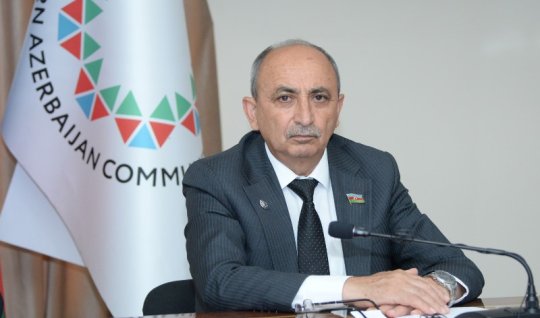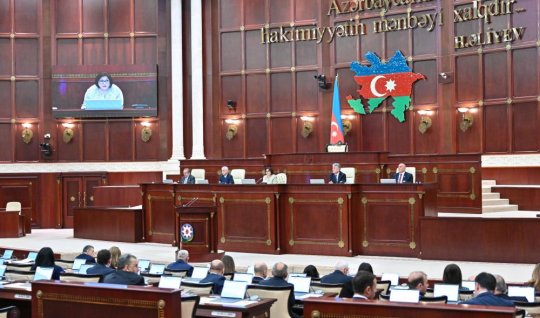The reason for the increase in fish prices in the local market - EXPLAINED

After the increase in beef prices in Baku, an increase in the selling price of several other food products, including fish, was recorded. Thus, in recent days, an average increase of 2-3 manats per kilogram of fish has been observed.
Modern.az contacted the founder and director of “United Fishes” LLC, ichthyologist Niyazi Heybətov, regarding the current price increase in fish demand.
He stated in his declaration to our website that no significant price increase is currently observed in lake fish:
“For many years, the price of these fish has remained almost stable. However, since some fish are imported from abroad, their prices increase. The main reason for the price increase of imported fish is the applied 18 percent tax. For example, when lake fish priced at 5 manats are sold to a company, their price, including tax, rises to 6 manats 50 qəpiks. When stores add their profit, the same fish is sold for up to 7 manats 50 qəpiks or 8 manats.”
According to the ichthyologist, fish are currently mainly imported to our country from Iran and Russia:
“A price increase in such fish imported from abroad is considered normal, as sellers have to pay taxes and transportation costs. I should note that since fishing is not yet fully recognized as an agricultural product, price differences can manifest themselves.”
He also emphasized that a decrease in the fish population in the Caspian Sea has been observed in recent years:
“Previously, “Kütüm” fish were abundant, but now, as they are rarely found in local waters, these types of fish are mainly imported from Iran. For this reason, "Kütüm" has become significantly more expensive. Most of the "Kütüm" sold in markets under the name of sea fish are imported products. As the number of "Kütüm" and other fish species in the Caspian Sea has decreased, their populations face the threat of extinction. Furthermore, there are not enough fish in the Caspian Sea, and catching them has become more difficult. Precisely for this reason, the price increase in sea fish is more noticeable compared to lake fish.”
N. Heybətov also added that since Azerbaijan is an oil-producing country, underwater oil and gas operations carried out in the Caspian Sea directly affect fish:
“As a result of the noise generated during the drilling of new wells and the placement of platforms, fish move away from Azerbaijani waters by approximately 70 kilometers. Larger fish are more sensitive to this noise, while smaller fish are relatively less affected. Furthermore, during oil spills, a certain layer forms on the water's surface, leading to oxygen deficiency and the narrowing of fish habitats.
Moreover, the reduction of freshwater sources flowing into the Caspian Sea also complicates the situation. As the volume of water flowing from the Ural and Kura rivers into the sea decreases, this negatively impacts the Caspian ecosystem, resulting in a fish shortage.”
Currently, differences in fish prices are observed depending on their species and origin:
Caspian sturgeon, being very rare, can cost up to 110 manats per kilogram. The price of fish kept in closed water bodies, i.e., under artificial conditions, is more reasonable. The price of such fish varies approximately between 20-40 manats per kilogram, depending on the species,” he noted.
-
23:05, Bu günScandal at the White House
-
22:55, Bu günArmenia became a strategic partner with a European country
-
21:36, Bu günTurkey's strongest parties - Poll results ANNOUNCED
-
21:15, Bu günPutin's visit to Turkey is expected
-
20:15, Bu günMarxists wanted to seize power in Russia
-
18:32, Bu günRussia is a threat to 8 countries
-
18:16, Bu günPSG will pay Mbappe 61 million euros
-
18:07, Bu günRubinyan replied to Khamenei's advisor: “Trump's way is not the Zangezur corridor!”
-
17:56, Bu günMaduro may flee to Belarus: our door is open! - Lukashenka
-
14:32, Bu günYerevan denied Moscow: Russia is not in the Zangazur corridor discussion!
-
12:51, Bu günUkraine declared Filip Kirkorov wanted
-
11:55, Bu günRussia must hand over Abbas Abbasov! - DEPUTIES
-
00:52, Bu günA European country is considering NATO membership
-
00:40, Bu günProgress was achieved on numerous issues - ZELENSKİ
-
00:10, Bu günThe West is trying to break up the Caspian Five - LAVROV
-
15 December 2025, 23:23A factory exploded in Iran - 9 people died
-
15 December 2025, 22:50Unique operation from Ukraine - Russia's submarine was destroyed
-
15 December 2025, 22:16An unknown drone approached Turkey - Fighters shot it down in the air - URGENT
-
15 December 2025, 19:51Trump's threat yielded no results - fighting continues
-
15 December 2025, 19:39Ukraine struck Astrakhan this time
-
15 December 2025, 19:28Terrorism prevented in Los Angeles
-
15 December 2025, 17:33Issued to date AMNESTIES
-
15 December 2025, 16:47Erdoğan's son's call for support for his father
-
15 December 2025, 16:38Trump reopens US embassy in Belarus
-
15 December 2025, 14:36Is a strong earthquake expected in Azerbaijan? - Official STATEMENT
-
15 December 2025, 14:13Mercenary Azerbaijanis joining the Russian army - What punishments await them...
-
15 December 2025, 13:50State advisor who worked with four presidents WHO IS IT... - PHOTO
-
15 December 2025, 12:56The Church has turned into a political party - this is unacceptable - Pashinyan
-
15 December 2025, 12:54What did Lukashenka gift to Trump's family?
-
15 December 2025, 12:09Armenia has requested help from Europe






















































